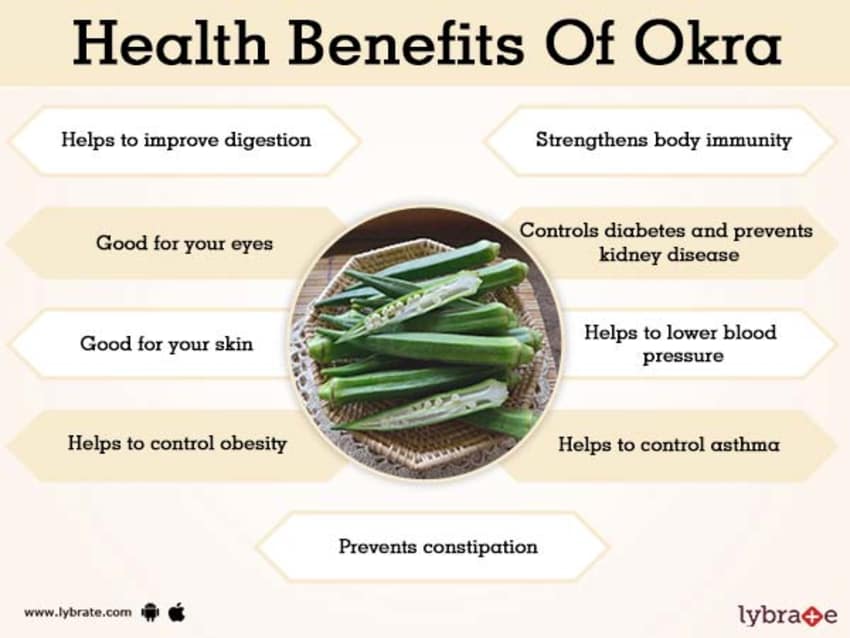

Still, we need more studies to confirm this effect in humans. In a 2020 study of 60 patients with type 2 diabetes who ate okra powder for 8 weeks, they also had lower cholesterol. In a 2014 study of mice, the ones that were fed okra powder eliminated more cholesterol in their poop than the other animals. The mucilage (gel-like substance) in okra may also help the body expel excess cholesterol. Research suggests that noshing on vegetables is a solid way to reduce your risk of heart disease. Point is, that crispy grilled okra on your plate could fill your belly *and* keep your immune system in fighting form. That’s a good thing since antioxidants beat back oxidative stress, which raises your risk of diabetes and other chronic disease. Like many other plants, okra is bursting with antioxidants. It also contains a fair bit of protein and fiber, which isn’t the case with all veggies. It’s just some extra help for your body that doesn’t substitute actual medical care.Bottom line: Okra offers essential nutrients like vitamins C, K, and A in a low calorie, low fat package. Of course, that doesn’t mean that you should replace your insulin with okra because it really doesn’t work like that.

So the health benefits of okra are apparent even to simple consumers. A 10-day regime based on okra extract showed significant improvements.Īnd in Turkey, people have been using roasted okra seeds as a traditional diabetes medicine for generations. Indian researchers who published a study in 2011 in the Journal of Pharmacy & BioAllied Sciences found that when their subjects ate dried and ground okra peels and seeds they had a reduction in their blood glucose levels. And some of the compounds in okra seed help normalize glucose and might end up helping researchers trying to find a cure for diabetes. Okra helps regulate the rate at which sugar is absorbed from the intestinal tract. Okra helps your heart thanks to its pectin content, which can help reduce cholesterol. It helps the waste pass from the body carrying with it toxins dumped into it by the liver. You know that mucilage thing that can be quite annoying when having okra? It serves a pretty cool purpose in your body. It helps your heart thanks to its pectin content, which can help reduce cholesterol by modifying the creation of bile within the intestines. It does that by binding excess cholesterol and toxins in the bile acids, making them easier to eliminate. There’s also plenty of soluble fiber in okra, which means that it improves the health of your heart and lowers the risk of cardiovascular disease. Nearly half of the contents of the okra pod is made up of soluble fiber in the form of gums and pectins, according to research from the Pakistan Journal of Food Science.

Plus: you have a lower chance of feeling constipated, and that’s always a win. It keeps your intestinal tract healthier and decreases the risk of colorectal cancer. Okra does that by lubricating the large intestines, easing your body into processing food. It is also rich in insoluble fiber, which really does good things for your digestion. The okra seed is rich in high-quality protein and you want the best if you plan on cutting down on meat, right? Okra is loaded with amino acids like lysine and tryptophan which basically means you can get plenty of protein from this food – comparable to soybean, in fact. The vitamin A and beta-carotene in okra help keep your eyesight at optimum functioning levels. And eye-associated illnesses might be tougher to catch.
Okra health benefits skin#
Also, your skin will feel a bit better too with all of those nutrients. Those nice green pods are loaded with vitamin A and beta-carotene, both vital for sustaining your eyes in watching movies, reading, and also gazing at your significant other. One serving has 51 milligrams of calcium. But just remember that you need about 1,000 milligrams of calcium daily, so a serving of okra isn’t really enough. So, if you’re also lactose intolerant, you can safely get some of your calcium from this veggie. It supports your muscles and your nerve-signaling functions. You also need calcium to regulate your heart rhythms, blood pressure, and cholesterol levels. Source of calcium for vegetariansĪre you a vegetarian in desperate need of some calcium and magnesium? Then okra might be your new friend, and it might help prevent calcium deficiency and magnesium deficiency. You could try this great okra bean stew for starters if you want to get in on the health benefits.ĥ health benefits of okra 1. My friend who lives in Greece cooked it later that night in the form of a wonderful shakshuka.


 0 kommentar(er)
0 kommentar(er)
